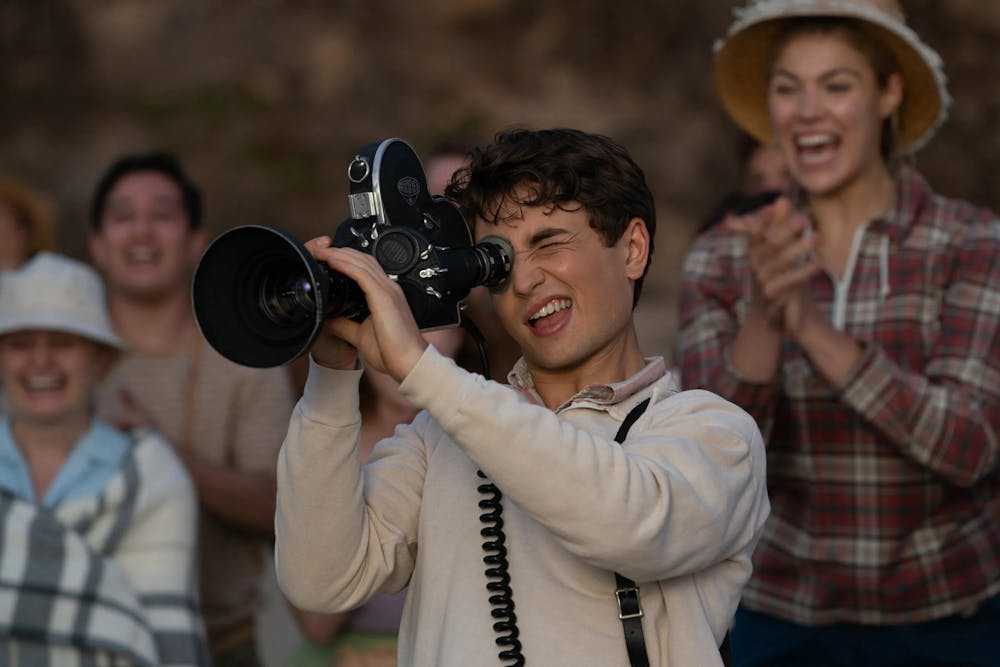He made us afraid to go in the water with “Jaws.” He gave the world its most beloved whip-wielding adventure hero in “Raiders of the Lost Ark.” He even resurrected the dinosaurs in “Jurassic Park.” Now, with “The Fabelmans,” Steven Spielberg has given audiences the story they didn’t know they wanted: his own. Sure, the semi-autobiographical premise doesn’t scream “blockbuster excitement” like many of the director’s biggest hits. Scale and spectacle, however, are not the trademarks of Spielberg’s filmography that have made him possibly the most revered director in history. They are certainly integral to his mass appeal, but it has always been the way that Spielberg puts them in service of his commitment to sound storytelling and his singular, childlike sense of wonder that causes people of all ages to fall in love with his movies. “The Fabelmans” brims with both of these characteristics, and together, they make Spielberg’s latest a warm, disarmingly earnest portrait of how a young man learned to express himself through the viewfinder of a Super 8 camera.
The film traces the lives of the Fabelmans, the Jewish American family of six who stand in for Spielberg’s actual siblings and parents. Spielberg himself is represented by Sammy Fabelman (Mateo Zoryan and Gabriel LaBelle), who as a young boy growing up in New Jersey finds his life forever changed by his first trip to the movies with his parents, Mitzi (Michelle Williams) and Burt Fabelman (Paul Dano). As a director, Spielberg has always had an uncanny knack for staging certain scenes in such a way that allows the audience to perceive action as if through the eyes of a child, evoking all the innocence and simple wonder at the world that comes with that perspective. The opening of “The Fabelmans” is one of those scenes. Watching Mitzi and Burt gently convince Sammy to enter the theater as he lingers fearfully outside the box office, we identify with the young boy through our own bittersweet recollections of the times our parents had to work up our courage. Once the showing of Cecil B. DeMille’s “The Greatest Show on Earth” begins, Sammy’s wide-eyed amazement at the moving pictures flashing across the screen causes us to join him in viewing what is objectively a dated, contrived film as nothing short of magical. One of “The Fabelmans”’ most captivating shots is of Sammy sitting in the car next to his mother on the ride home from the theater. She asks him, “What was your favorite part?” but the boy doesn’t answer — he stares ahead, his eyes unblinking, lost in a daze. Thanks to Spielberg’s direction, we share a bit of that sensation with him.
Overwhelmed by the mayhem of the train crash scene in “The Greatest Show on Earth,” Sammy returns home searching for a way to process what he has just seen on the silver screen. He finds it in a toy train set and his father’s film camera. Sammy recreates the crash he witnessed in the movie and captures it from various angles on 8 mm film, presenting the finished short film to his awestruck mother with the explanation, “I need to see them crash.” So begins an obsession with filmmaking that grows to become Sammy’s greatest passion, one that draws the ire of his practical engineer father and forms a rift with his mother when his camera accidentally captures an act of infidelity. In the end, though, it is the unceasing desire and unique talent with which Sammy chases his cinematic dreams that secures the support of his parents and puts him on the path to Hollywood history.
A time jump shortly after Sammy’s seminal screening introduces us to a teenage Spielberg stand-in played endearingly by newcomer Gabriel LaBelle. The cast surrounding him are just as noteworthy, with Paul Dano lending quiet decency to his portrayal of Spielberg’s father and Judd Hirsch dominating a pivotal scene as Spielberg’s eccentric uncle, who pushes the budding filmmaker to pursue a life in the arts. But despite the admirable acting done to honor the men in the director’s upbringing, it is Michelle Williams in the role of Spielberg’s mother who shines brightest. As a concert-level pianist who never got the chance to prove her talent, Mitzi finds a kindred spirit in her son when he discovers his artistic inclination towards cinema. She nurtures his passion, imploring him, “You do what your heart says you have to.” Williams is incandescent in the role, unafraid to delve into the manic fits of depression that often overtook Spielberg’s mother, yet always remaining true to what the woman ultimately was to her son: a source of light and inspiration.
Her line — “You do what your heart says you have to” — captures the theme of “The Fabelmans,” a film about how pursuing what you love will always bring you into both conflict and communion with who you love. For Steven Spielberg, what was never a question. It could have been different, though. His parents could have brought their young son to a baseball game, or they could have put a trumpet in his hands. But they didn’t — they took him to the movies. On behalf of anyone who has ever seen a Spielberg film, thank you, Mr. and Mrs. Fabelman.
Jack Torpey '24 (he/him) is an Arts and Culture Editor. He writes film reviews for the Reel Critic column.
Jack is studying English with a minor in Film and Media Culture. Outside The Campus, he works as a peer writing tutor at the Writing Center and is a member of the Middlebury Consulting Group.




